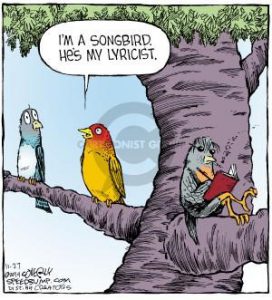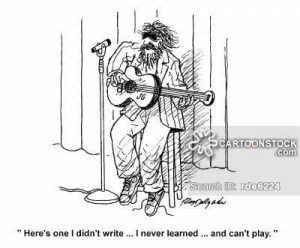 On the 30th of September, 2016 – the Madras High Court passed a significant order on the copyright infringement of song lyrics in Susi Ganesan & Others v. Elango (the order is available here). Warning: long post ahead!
On the 30th of September, 2016 – the Madras High Court passed a significant order on the copyright infringement of song lyrics in Susi Ganesan & Others v. Elango (the order is available here). Warning: long post ahead!
Factual Background
The Defendant, both an advocate practicing in the Madras High Court as well as a Tamil Lyricist, was hired by the Plaintiffs to compose the lyrics of a song titled ‘Hey, Excuse me, Mr. Kandasamy’ for their film ‘Kandasamy’. In accordance with this agreement, he wrote part of the lyrics, referred to as the ‘pallavi’ portion. It was this portion that he read out over the phone to the Plaintiffs, as well as sent to them on a CD. He claims that the Plaintiffs included the lyrics in the song that features in the film, and credited someone called ‘Mr. Vivek/Vivega’ for them. I found this on YouTube, I hope it’s the official version that was released.
In 2009, he had filed civil suit (C.S 36/2009) seeking a declaration that only he could exploit all rights in respect of the lyrics. On the 18th of April, 2009, a single judge of the Madras High Court passed an order that there was prima facie evidence to show that the Defendant had composed the ‘pallavi’ portion and had granted an interim injunction of the use of only that portion. The matter was then appealed at the end of the month to a division bench, where the order was modified to the effect that the injunction was suspended, but the Plaintiffs were directed to display the name of the Respondent along with the ‘Mr. Vivega’ they were already crediting. Further orders were passed in June 2009 which mandated the name of the Defendant – ‘Mr. V. Elango’ to be displayed as the lyricist of the ‘pallavi’ portion. This suit is still pending.
The civil suit notwithstanding, he filed a criminal complaint (C.C 3239/2009) for the offences of copyright infringement and criminal conspiracy. The Plaintiffs then filed the present suit (Crl.O.P. 15910/2016) to call for the records of, as well as quash the criminal complaint. In the criminal complaint, the Defendant primarily alleges the infringement of his rights held in the lyrics, He argues that he alone is entitled to exploit all rights in the lyrics, and prays for an interim injunction restraining the Plaintiffs from infringing his rights by using his composed lyrics in their film. On the other hand, the Plaintiffs base their defence on the fact that the Defendant had composed only the ‘pallavi’ portion, or the frills of the song and not the ‘saranam’ portion, which they explain to be the crux of the song.
The order passed is quite abrupt, encompasses a mere eight pages, does not expound on case law relied on, and barely explains the stance the Court wishes to take on infringement. The Court first chides the Defendant as he was “presumed to know the law”, being an advocate. They then note that there was no formal agreement entered into between the two parties on the lyrics, and question why the Defendant waited till the movie was released to file the complaints, when he accepted that his lyrics were being used in the trailer as well.
The Court then allowed the petition and quashed the criminal complaint, stating that since several orders had been passed in the civil suit, and as it was still pending, the Defendant’s rights “had not been crystallised”. I see two problems with this decision
1. There is no bar on maintaining both civil and criminal proceedings simultaneously
The Supreme Court, in its 2008 and 2009 decisions of P. Swaroopa Rani v. M. Hari Narayana and Vishnu Dutt Sharma v. Smt. Daya Sapra has recognised that there is no bar to civil and criminal proceedings running parallel. Why then, would the court dismiss the criminal complaint on this ground? The orders passed in the civil suit should not have affected their adjudication on a petition for copyright infringement.
2. Dismissal of the infringement claim
What is also in desperate need of clarification, is their stance on the alleged copyright infringement that this order should have centred around. The Court based their decision to quash the complaint on the fact that there was prima facie evidence to show that the Defendant composed only five out of ten lines, or the frills, and not the crux of the song. They stated that “viewed from this perspective”, the criminal complaint for infringement was “an abuse of the process of law”. This case raises more questions than it answers. It is clear that the Court has mandated the display of The Defendant’s name in the credits of the movie. Why they would accept this earlier ruling, but then comment on the distinction between the ‘pallavi’ and the ‘saranam’ in dismissing an infringement petition needs some explanation.
Existing Stance on Copyright in Lyrics
India has the unfortunate reputation of not giving lyricists their due when it comes to copyright protection. As noted by Prof. Basheer, it started with the troubling 1977 Supreme Court decision of IPRS v. Eastern India Motion Pictures that interpreted Section 17(b) to mean that the ownership of copyright in all underlying works incorporated into a movie vested with the film producer, unless a contract provided otherwise.
2011-2012 was marked by a series of cases from different High Courts, essentially ruling that radio stations broadcasting/communicating sound recordings were required to pay royalty to only the owner of the sound recording and not the owner of the lyrics or the musical works which had been incorporated into the sound recordings. It was first the Kerala High Court, followed by the High Courts of Bombay and then Delhi in Music Broadcast Pvt. Ltd. v IPRS and IPRS v Aditya Pandey. The Supreme Court in September 2016 affirmed the holding in IPRS v. Aditya Pandey, dismissing an appeal filed by IPRS and ICSAC. The 2016 Bombay High Court judgement of IPRS v. Entertainment Network dealt with the validity of an arbitral award that ruled the same way.
Contract of service
While Section 17 of the Copyright Act deems the author of a work to ordinarily be the first owner of copyright, it provides for the employer to own copyright over any work made by an employee in the course of employment, under a contract of service or apprenticeship. The law as it was in 2009 has not changed in this regard. Zee Entertainment Enterprises Ltd. v. Mr. Gajendra Singh and Ors., a 2007 Bombay High Court decision, summarised the changing tests to determine a contract of service with regard to the ownership of copyright.
The Court noted that the original test of the control that the employer has over the employee in carrying out allotted tasks was no longer the exclusive test to follow. They additionally recommended a broader, more flexible approach to determine this question; and stated that the control theory must be considered along with other factors, that would vary with change in the nature of professions, commerce, business and industry. In the present case, the Court noted that there was no formal agreement between the parties, but did not delve into the nature of their contractual relationship. This is an important point to be clarified to determine the validity of the Defendant’s claim.
De minimis
We have extensively covered the issue of the de minimis exception to copyright infringement on the blog. This principle essentially refers to a trivial legal violation that is insufficient to warrant legal remedy. While earlier cases have dealt with the similar issue of alleged copyright infringement in a part of a song, I believe that this case can be differentiated on the basis of the contribution by the Respondent. The use of 4-5 words, commonly used in the country was held to be de minimis, while the use of 11 seconds from an earlier song merited an injunction for the copied part. In an excellent 2012 decision of the Delhi High Court (India TV Independent News Services v. Yashraj Films), the factors to be taken into consideration for determining use as de minimis were explained, and it was held that the use of five words of a song would not constitute infringement.
In this light, I believe the Court should have further examined the claim of copyright infringement, to determine the significance of the ‘pallavi’ portion of the song. The principle of de minimis, as well as the possibility of this being a contract of service should have been investigated as well, considering their relevance to the case.
I’d love to hear from our readers on this case. Please do leave a comment below!
–
